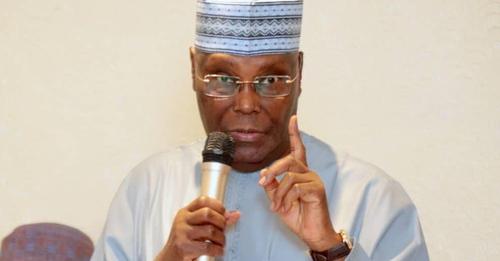Education
Atiku Criticizes FG’s 18-Year Age Limit for NECO, WASSCE as Absurd

Former Vice President Atiku Abubakar has slammed the Federal Government’s decision to impose an 18-year age limit for NECO and WASSCE exams, calling the policy absurd and restrictive for Nigerian students.
Atiku Abubakar, the presumptive Presidential candidate of the Peoples Democratic Party for 2023 election has condemned President Bola Tinubu’s Federal Government over their imposition of an age restriction on NECO and WAEC examinations. The former Vice-President denounced this policy as nonsensical while berating it for erecting a barrier to access scholarships.
Remember that individuals under the age of 18 are prohibited by the Federal Government from taking part in NECO and WAEC exams.
On Channels Television’s ‘Sunday Politics’ program, the Minister of Education, Prof. Tahir Mamman disclosed this information.
According to Mamman, the West African Senior School Certificate Examination conducted by WAEC and the Senior School Certificate Examination administered by NECO must comply with an age restriction of 18 years for candidates as instructed by the federal government.
On Wednesday, the ex-Vice President expressed his disapproval of the policy as being obsolete via his authenticated Facebook page.
Atiku characterized the policy as contentious and urged those who uphold intellectual freedom and accessibility to universally denounce it.
“He’s of the opinion that Tinubu’s policy on age limit for admission into tertiary institutions is outdated and belongs to a bygone era.”
Labeling age limits for admission to tertiary institutions as recent policy by the Federal Ministry of Education is both nonsensical and discourages academic achievement.
READ ALSO: “FG Implements Age Limit for WAEC and NECO Exams
The policy conflicts with the idea of clear division of duties in a federal government system like ours and paints a vivid picture of how the Tinubu administration wanders aimlessly like an adrift sailor on rough waters.
In what manner could the multitude of problems afflicting our educational system lead to anti-scholarship regulations being considered a reasonable progression?
The Nigerian constitution places education on the concurrent list of schedules, granting more responsibilities to sub-national governments than to the Federal Government.
Allowing sub-national governments to establish their own education laws or regulations was emphasized by the ex-Vice President as the most efficient global strategy.
Atiku stated that the federal government’s legislation on education as a decree is beyond constitutional bounds.
Enabling sub-national governments to create laws or regulations on education is the most effective global standard for such monitoring.
The government’s announcement of a repugnant policy, coupled with their unintentional statement expressing no intention to support exceptionally talented students, is disheartening. This portrayal of Nigeria as a country that does not value gifted individuals is an unfortunate embarrassment for the intellectual community.
It is ironic that if the federal government were to have a role in education, it should establish systems for identifying and awarding scholarships to talented students without considering their age prior to seeking admission into higher educational institutions.
Everyone who values intellectual freedom and accessibility must strongly condemn this outmoded policy.
